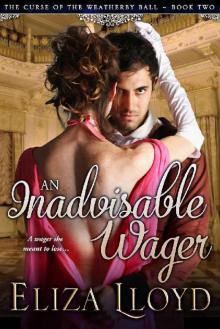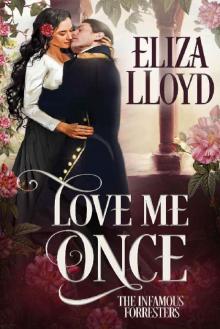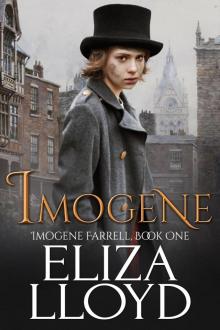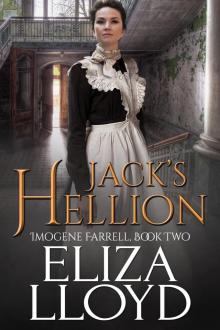- Home
- Eliza Lloyd
An Inadvisable Wager (The Curse of the Weatherby Ball Book 2)
An Inadvisable Wager (The Curse of the Weatherby Ball Book 2) Read online
An Inadvisable Wager
Book Two, The Curse of the Weatherby Ball
By
Eliza Lloyd
All Rights Reserved
Copyright 2021
Chapter One
Nora Blasington had never been to the Weatherby Ball because she had never been invited, but what was one more scantily clad Venetian seductress amongst the nobles vying for the most ridiculous costume at this year’s themed Carnival of Venice?
The ball wasn’t famous for being a themed masque. It wasn’t famous for being the gathering place for the crème de la crème of society. It wasn’t famous for the scandalous dress, the Medici-level food selection or the ball’s extravagant decorations.
It was famous for being cursed. If it could go wrong, it would. And since it was Nora’s first appearance, she would have to make it a grand one.
Shenanigans at previous Weatherby Balls had been featured in the London Times in the gossip section, except it wasn’t really gossip. The delicious and embarrassing on dits were true.
The countess whose husband died a few days after the ball. Oh no, there was no connection to the apoplectic fit he had at the ball when his wife had disappeared for part of the evening. Or in the speculation about a child born exactly nine months to the day after the ball.
There was the granddaughter of a duke who was saved from a scandalous liaison. The earl who had lost a large fortune gambling. The viscount caught cheating at cards. The missing jewels. The indiscreet wife. The death of a marquess when he tumbled down the curving staircase and was pierced in the heart by his Arabian Nights scimitar. All perfect examples of what guided Nora and which she thought she could achieve in one evening.
The Weatherbys might not care that the entire ton believed the ball to be cursed but they would care if they knew the daughter of the ton’s most notorious thief was in attendance.
Talk about curses.
Her father, George Shirley Blasington, the third Earl of Wargrove, was hanged at Newgate when she was a child. Her wonderful, humorous papa snatched from her like an unprotected purse in Seven Dials.
Her brother, Timothy, possessed the title now, but it did him little good. The Blasingtons were shunned in most circles. No, not shunned—forgotten.
Tonight, Timothy was also at the ball. He’d been the one to ask Lady Weatherby where the wicked ones were gathered. He was watching as he had been instructed and maybe praying vehemently that nothing went wrong, and that with luck they’d get their respect and property back. Nora had her own ideas about that—hence the Weatherby Ball. But Timothy would be along shortly, ready to play his part as the indignant earl saving his sister from scandal.
Would all those nights of charades and all the acting out of famed stories at the direction of Lady Fortenay finally come to some purpose? Would their varied conversations and Nora’s developed reasoning skills be sufficient to spar with a few sons of the ton?
Was there a better place to raise a little theater?
She pursed her lips, painted an outré red, and raised her brows as she passed through the crowd. Her mask was a simple black domino which she’d decorated with shiny beads and outlandish feathers that soared upward. No one would recognize her, especially since it seemed Lady Weatherby had wanted an atmosphere reminiscent of sinful Venetian nights and kept the number of candles lit by about half, Nora guessed.
And her costume? Well, she couldn’t afford extravagant, so she’d reworked one of her old dresses with the help of her lady’s maid. It was now dyed with startling red and black slashes with an eye-catching, one-of-a-kind black silk swath of material that unfolded like butterfly wings when she lifted her hands and spread her arms. Beads and feathers made the gown stiff and heavy but undeniably elegant, especially in the darkened corridors and rooms of the mansion. But, she would admit to no one, she was as proud as a Sunday peacock strutting around the room.
She was noticed, which was quite an accomplishment with this crowd, but she was focused on the goal: three very, very wicked men who had what she wanted.
Timothy swore she’d lost her mind. Yet, those she most wanted to see punished were in attendance. The London Times was also the source to understand the practices and patterns of ton nobles. They weren’t shy about revealing their excesses.
Those same nobles who’d attended her father’s hanging were snobbish hypocrites. She and Timothy weren’t shunned because their papa was a magnificent thief—they were shunned because the ill-gotten gains were gone. Had he a fortune, everyone from the gaoler to the judge could have been purchased. And the ton nobles would have winked at his activities.
And then, the last things the Blasingtons had left were stolen by a trio of crooks. Fair and just payback, some had whispered. Theft of the thief’s gain. No! Papa had been a humorous trickster who pilfered baubles and other assorted bits and bobs. Granted, he was especially good at it, but never with malice.
Since she was a child, Nora had determined she would reclaim Henbury Hall. It was a wistful dream. Who knew how she could accomplish such a thing? She’d scribbled notes describing grandiose plans, read stories of revenge, swung sticks at imaginary windmills and became Nora, the Destroyer of the Wicked, as she ran through the forests around Whitmarsh.
And tonight, she was Nora the Avenger. She’d pretend to be the woman who could lure men into handing over their assets. Find out the truth, if she could. Dazzle, deceive. Bewitch, bluff.
All the while hiding behind her mask and not revealing a moment of fear because of her audacious scheme. Oh, there was fear. Not of being discovered, but of failing because her chances were small, and her prey clever.
If that didn’t work, she’d be the petty pickpocket and card sharp Papa had taught her to be. Those tricks were easy to practice, especially on Grandy. She’d always confessed afterward, and he would give her a piece of candy telling her what a clever girl she was.
She’d spotted the three wicked sons earlier and watched as they made the rounds of the ball, dancing on occasion and then coming back together to discuss their conquests. When they strolled toward the card room, Nora followed ready to roll the dice. Ready to win back the deed to Henbury Hall. Or the tin mines. Or the horses.
And ready to sacrifice herself for the wager of a lifetime.
* * * * *
The lively card room was the only place to be at the Weatherby Mansion on the night of the Weatherby Ball. And the Weatherby Ball was the only ball not to be missed in London during the Season.
Unless one actually enjoyed dancing with conniving debutantes, avoiding scheming mothers and dodging inappropriate touches from practiced widows. And guessing the entire night who might be doing the conniving, scheming and touching.
Gabriel Sutter, Earl of Carlow, took his seat at the table along with his Eton chums. They obliged the evening’s hostess with the semblance of a costume. Gabriel wore a black mask, covering his cheeks but not his gleaming and rakish smile—part of his costume tonight, as he was in a flirtatious mood. He wore a thigh-length cape as well. What did he know about Venice? He’d spent his grand tour hunting in Scotland.
“Remind me again why we are sitting together when we could be stealing money from some of these old codgers who won’t miss it?” Nash Hildebrande asked. He was the newly minted Viscount Andover, and his mother was determined to find him a wife this Season. It was all about the grandchildren—childlessness was an affliction all of them shared and harping mothers thought they knew a quick cure.
“We must warm up first,” Gabriel said. “My fingers are tingling, though, to take whatever you will hand over
.”
“Gentlemen, are you ready to begin?” the dealer asked. She was the reason Gabriel had selected the table he had. Her Carnival of Venice costume was exquisite with its vibrant blacks and reds. The butterfly wings were exposed as she dealt the cards. Her lips were posed in a permanent half-smile made more seductive by the painted-on sharp red color.
Ellis Rawden was only a few weeks away from his title. His father, the earl of Fromme and Rode, had entered the creative stage of consumption and his physicians thought it would not be much longer. There was little Rawden could do in the meantime except lose some of his father’s money to his friends.
“Drink up, Ellis. Lady Weatherby intends for you to enjoy yourself tonight,” Andover teased as he removed a simple domino mask.
The cards were dealt quickly.
“If only I could enjoy such temptations. Now is not the time to distress Mother by coming home smelling of whisky and women.”
“She’s in South Weald. I don’t think her sense of smell is that good,” Nash said, studying his cards.
“What? There are women to be had?” Gabriel said, glancing toward the mostly silent dealer. “Lady Weatherby did not mention that in the invitation.”
The dealer’s eyes flashed behind the mask. “Perhaps Lady Weatherby was afraid for her guests’ virtue. One cannot be too careful on such a night as this,” the sultry dealer said as she dealt the third hand—the blind vingt-et-un round.
“Is there safety behind a mask and a deck of cards, then?” Gabriel asked. “Enough to keep one’s virtue?”
“Keep? You assume I have virtue.”
Gabriel’s palms itched, and not because of the pile of coins in the middle of the table.
“She’s got you, Carlow. One can never be too sure about a woman’s virtue. Until it’s too late,” Andover said.
“Is that an insult, sir? I was speaking of Aristotle’s Virtues. Honesty. Fairness. Justice,” she said.
Gabriel cleared his throat as the cards were turned, revealing that Rawden had won that hand. “The lady has turned a clever trick, Ellis. Who are you, if I may ask?” He examined her again, believing he must know her, yet feeling as if she were a complete mystery.
“Another lady of the ton, looking to find virtue in the wrong places,” she said, proceeding to lay out the Sympathy and Antipathy deal in front of the players. “Your call, my lord.”
“Sympathy,” Rawden called, ignoring Carlow’s conversation with the tempting enchantress.
“Antipathy,” Andover added.
“Sympathy. On the night of the Weatherby Ball? Obviously, you don’t know the ball’s reputation. It’s my belief you will only find dishonesty, unfairness and injustice.” Gabriel peeked at his cards.
“Oh, my! You are so harsh in your judgments,” she said.
He leaned toward her. “I know these people. They all have hidden secrets. I would like to find out yours when you are ready to walk along the terrace. Later, perhaps,” he whispered.
“You know what they say about virtue and vice,” she said.
“Oh? What is that?”
“Virtue whispers; vice screams. No one cares about the scrupulous minister or the honest tradesman. But commit an immoral act and one can be the talk of the ton for many months to come.”
“We humans are not but contrarians.”
“Fools might be a better description,” she said.
“The lady doesn’t think too highly of us, Carlow,” Andover said.
“I think she may be right. Can you name a more foolish group than those of us who gather at Lady Weatherby’s ball every year, praying that there will be scandal but certain we are immune from the very thing we seek?”
“I wouldn’t mind a scandal,” Andover said. “Especially if she’s beautiful.”
Gabriel had the same thought. And he didn’t think he needed to look further than the chair to his left.
“Now that you have your title,” Ellis prodded. “I, on the other hand, must maintain the strictest decorum.”
“Don’t wish him gone,” Gabriel said. “We don’t get them back.” His own father had passed a year ago. Gabriel had always known he was the heir to Carlow, but the reality of it blunted any possible joy when it actually happened.
“It’s the lingering, along with the inability to do anything. Mama has aged ten years. My sister weeps and moans at every visit, though I imagine Sissy will be a rock when Father actually passes.” Ellis kept his gaze down. Gabriel knew what it meant and why Ellis was behaving circumspectly. There really was a drain on strength as one prepared to grieve.
“That’s why they invented cards,” Andover added. “And drink.” He lifted a hand to signal a house servant who then hurried away to fetch whisky. Lady Weatherby’s mansion was lavish on an average day. Her servants well-trained. Her food delicious. The hospitality unmatched. But the weeks before the ball, Gabriel had heard, were a paroxysm of extravagance and pageantry as the plans were laid into motion.
Gabriel glanced about the card room, recognizing most of his male acquaintances, many of whom had costumed with some modesty. The women, however, went to elaborate lengths to garb themselves with strict adherence to the ball’s theme, rendering them nearly Delphic.
Unless one could talk a woman into revealing herself. It wasn’t that he was out of practice, but he had been very busy at one of his estates through the winter, not giving much thought to women in general. Maybe he just needed a mysterious card dealer, dressed as a Venetian to focus his attention.
“No, that’s why they invented gardening,” Gabriel said.
“You’ll never be done with that project. You’re going to disgust the fine ladies tonight when you hold hands during the waltz,” Andover said.
Gabriel turned one palm up. He’d earned his blisters earlier this year, but his skin had grown a little tough. “It’s not so bad,” he said, rubbing his thumb over the resulting calluses.
There were several more silent deals, except for the quick directions to the dealer for more cards and the flutter of her wings as her arms moved. Gabriel watched her hands mostly, graceful and sleek, until there was a kerfuffle outside the drawing room doors. In unison, the three of them glanced toward the open entryway, craning to see around the others gawking in the same direction, hoping to catch a glimpse of the obvious mischief. All for a bit of gossip around the breakfast table in the morning.
“It’s nearing midnight. Perhaps the first scandal of the evening is happening at this very moment,” Gabriel said.
“Enough, I say,” Ellis Rawden stood, hand to the back of his chair.
“I’m good,” added Andover, collecting his money and sliding a few coins toward the dealer in appreciation.
She smiled, lips sealed, eyes squinting, and swept the two schillings up. “Thank you, my lord.”
Gabriel watched them hurry away. Whatever transpired in the hall, he was glad for it. The private opportunity to know her better wasn’t cursed, only fateful. The delicious maiden stretched her arms across the table and collected the cards. Gabriel put his hand over hers. “Now, isn’t it time you told me your name?”
“The idea of a masked ball is to remain anonymous. You’ll just have to guess.”
“You do realize that of le beau monde, there are only four-hundred or so here. I would guess your name eventually.”
“Guess? That’s not the same as being certain.”
“Well then, why not give me a hint?”
“I’m a woman.”
He laughed. “I know so few women with a good sense of humor. Now, tell me more. Your first name? Your age? Do I know you? If so, how did we meet?”
His coins were piled in front of him. She put her finger on one of the gold sovereigns and pulled it toward her, dragging it slowly across the velvet-covered card table, depositing it in front of her. As if they were playing a new game.
“Twenty-one questions?” Gabriel asked.
“No, just a few. I see only four more sovereigns. That is the
limit of my willingness to play your game.”
“My game? It seems you hold all the cards.”
“I am twenty-three,” she said, answering his question. She reached for another coin and he grabbed her hand.
“What color are your eyes?”
“Are you sure that should be your next question? In the right light, you could see for yourself rather than waste a coin.”
“Where can we find the right light?”
“Hmm. You’ve asked two fairly impractical questions now. You’re not very good at this game, are you?” She propped her chin on the heel of her hand and stared at him. “I’d feel like a thief if I answered either of them.”
“I gather asking your name again is off the table?”
“Is that a question?”
“A statement. I’m just talking out loud,” he said. “You want me to struggle with this which means you know me more than just in passing. But the trouble is, I know several hundred families with whom you might be attached. So, what is your mother’s first name?”
“Oh, that’s an easy one. The same as mine. Our middle names were different, if that helps.” She pulled a coin across the table, then stacked it with her other sovereigns.
Gabriel leaned back. How many mothers named Mary were there? Or Elizabeth? Or Victoria? Just as many as there were daughters with the same name. “You’ve played this game before?”
“Of course! And obviously you haven’t.”
“Just between you and me, you weren’t really talking about Aristotle’s Virtues, were you?”
“No, I wasn’t.” Another coin slid across the table. “What a poor choice of questions, my lord.”
“Have you been married before?” Virtue might be a flexible thing if she happened to be a widow.
“Alas, not even a proposal.” She plucked up the last of his sovereigns, then opened a small reticule that she’d drawn from somewhere on her person. Not a bad night’s earnings, he thought, especially since she hadn’t provided him any real information.
He smiled, pulling her clever fingers into his grip. “Tell me you have a large dowry, and I will remedy that on the spot.”

 An Inadvisable Wager (The Curse of the Weatherby Ball Book 2)
An Inadvisable Wager (The Curse of the Weatherby Ball Book 2) Love Me Once (The Infamous Forresters Book 3)
Love Me Once (The Infamous Forresters Book 3) Imogene
Imogene The Frenchman's Widow
The Frenchman's Widow Jack's Hellion
Jack's Hellion Another Lover
Another Lover A Mistress To Remember (Birds of Paradise Book 3)
A Mistress To Remember (Birds of Paradise Book 3)